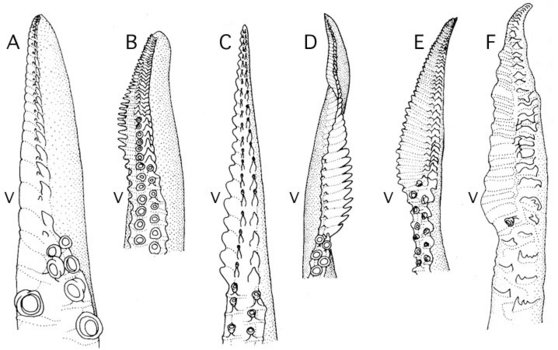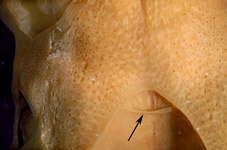Todarodinae
Richard E. Young and Michael Vecchione


This tree diagram shows the relationships between several groups of organisms.
The root of the current tree connects the organisms featured in this tree to their containing group and the rest of the Tree of Life. The basal branching point in the tree represents the ancestor of the other groups in the tree. This ancestor diversified over time into several descendent subgroups, which are represented as internal nodes and terminal taxa to the right.

You can click on the root to travel down the Tree of Life all the way to the root of all Life, and you can click on the names of descendent subgroups to travel up the Tree of Life all the way to individual species.
For more information on ToL tree formatting, please see Interpreting the Tree or Classification. To learn more about phylogenetic trees, please visit our Phylogenetic Biology pages.
close boxIntroduction
We follow Roeleveld (1988) in considering this subfamily to be united by the modifications of the hectocotylus. The genus Todaropsis has been considered by some authors to belong in the subfamily Illicinae, in spite of a club dactylus with suckers in only four series, because of the lack of foveola in the funnel grove.
Brief diagnosis:
an ommastrephid ...
- without photophores.
- without carpal locking apparatus on tentacular club.
- with foveola (except Todaropsis) but without side pockets.
- with thickened trabeculae on distal ventral protective membrane of hectocotylus.
Characteristics
- Arms
- Hectocotylus with enlarged distal ventral protective membrane with thickened trabeculae producing a picketed effect.
 Click on an image to view larger version & data in a new window
Click on an image to view larger version & data in a new window
Figure. Oral views of hectocotylized left or right ventral arms of representatives of Todarodinae genera. A - Todarodes filippovae, distal part of right arm IV. B - Todarodes pacificus, distal part of right arm. C - Martialia hyadesi, distal part of right arm IV. D - Notodarus sloani, distal part of right arm IV. E - Notodarus gouldi, distal part of right arm IV. F - Todaropsis eblanae, distal part of right arm IV. v - Ventral side of arm. Drawings from Roeleveld (1988).
- Hectocotylus with enlarged distal ventral protective membrane with thickened trabeculae producing a picketed effect.
- Tentacles
- Tentacular club with dactylus suckers in four series.
- Carpal locking-apparatus absent.
- Tentacular club with dactylus suckers in four series.
- Head
- Funnel groove usually with anterior foveola (absent in Todaropsis) and without side pockets.
 Click on an image to view larger version & data in a new window
Click on an image to view larger version & data in a new window

Figure. Left - Ventral view of the funnel groove comparing modifications in two of the subfamilies. Drawing modified from Roper, et al. (1985). Right - Photograph of the funnel groove of Nototodarus hawaiiensis showing foveola (arrow) without side pockets. Photograph by R. Young.
- Funnel groove usually with anterior foveola (absent in Todaropsis) and without side pockets.
- Photophores
- Photophores absent.
Table. Comparison of genera of Todarodinae
| Hectocotylus | Funnel groove with foveola | Tentacular stalks with free trabeculae | Largest manus sucker with | Largest manus sucker with teeth | |
| Martialia | Left or right arm IV | Yes | Yes | one tooth enlarged | linked by intermediate ridges or plates. |
| Todarodes | Right arm IV | Yes | No | generally subequal teeth | linked by intermediate ridges or plates. |
| Nototodarus | Both arms IV | Yes | No | one tooth enlarged or subequal teeth | linked by intermediate ridges or plates. |
| Todaropsis | Both arms IV | No | No | subequal teeth | without intermediate ridges or plates |
References
Roeleveld, M. A. 1988. Generic interrelationships within the Ommastrephidae (Cephalopoda). P.277-314. In: M. R. Clarke and E. R. Trueman (eds.). The Mollusca. Vol. 12. Paleontology and Neontology of Cephalopods. Academic Press, N.Y., 355pp.
Title Illustrations

| Scientific Name | Unknown species of Todarodinae |
|---|---|
| Specimen Condition | Fresh |
| Sex | Female |
| View | Dorsal |
| Copyright |
©
Mark D. Norman

|
About This Page
Richard E. Young

University of Hawaii, Honolulu, HI, USA
Michael Vecchione

National Museum of Natural History, Washington, D. C. , USA
Correspondence regarding this page should be directed to Richard E. Young at
dickphyllisyoung@gmail.com
and Michael Vecchione at
vecchioneM@si.edu
Page copyright © 2016 Richard E. Young and Michael Vecchione
 Page: Tree of Life
Todarodinae .
Authored by
Richard E. Young and Michael Vecchione.
The TEXT of this page is licensed under the
Creative Commons Attribution-NonCommercial License - Version 3.0. Note that images and other media
featured on this page are each governed by their own license, and they may or may not be available
for reuse. Click on an image or a media link to access the media data window, which provides the
relevant licensing information. For the general terms and conditions of ToL material reuse and
redistribution, please see the Tree of Life Copyright
Policies.
Page: Tree of Life
Todarodinae .
Authored by
Richard E. Young and Michael Vecchione.
The TEXT of this page is licensed under the
Creative Commons Attribution-NonCommercial License - Version 3.0. Note that images and other media
featured on this page are each governed by their own license, and they may or may not be available
for reuse. Click on an image or a media link to access the media data window, which provides the
relevant licensing information. For the general terms and conditions of ToL material reuse and
redistribution, please see the Tree of Life Copyright
Policies.
- First online 06 April 2007
- Content changed 25 April 2008
Citing this page:
Young, Richard E. and Michael Vecchione. 2008. Todarodinae . Version 25 April 2008 (under construction). http://tolweb.org/Todarodinae/19934/2008.04.25 in The Tree of Life Web Project, http://tolweb.org/








 Go to quick links
Go to quick search
Go to navigation for this section of the ToL site
Go to detailed links for the ToL site
Go to quick links
Go to quick search
Go to navigation for this section of the ToL site
Go to detailed links for the ToL site